Related Research Articles
The Republic of South Africa is a unitary parliamentary democratic republic. The President of South Africa serves both as head of state and as head of government. The President is elected by the National Assembly and must retain the confidence of the Assembly in order to remain in office. South Africans also elect provincial legislatures which govern each of the country's nine provinces.

Bophuthatswana, officially the Republic of Bophuthatswana, and colloquially referred to as the Bop and by outsiders as Jigsawland was a Bantustan that was declared (nominally) independent by the apartheid regime of South Africa in 1977. However, like the other Bantustans of Ciskei, Transkei and Venda, its independence was not recognized by any country other than South Africa.

A Bantustan was a territory that the National Party administration of South Africa set aside for black inhabitants of South Africa and South West Africa, as a part of its policy of apartheid.

Kgosi Lucas Manyane Mangope was the leader of the Bantustan (homeland) of Bophuthatswana. The territory he ruled over was distributed between the Orange Free State – what is now Free State – and North West Province. He was also the founder and leader of the United Christian Democratic Party, a political party based in the North West of South Africa.

The United Christian Democratic Party is a minor political party in South Africa. It was founded by Lucas Mangope, leader of the Bophuthatswana bantustan in 1997, as a successor to the Tswana National Party, and led by him for the first fifteen years of its existence. Mavis Matladi was elected as its leader on 29 January 2011 after the expulsion of Mangope. Matladi died in December 2011. Isaac Sipho Mfundisi was elected president on Saturday, 7 January 2012.

North West is a province of South Africa. Its capital is Mahikeng. The province is located to the west of the major population centre and province of Gauteng and south of Botswana.
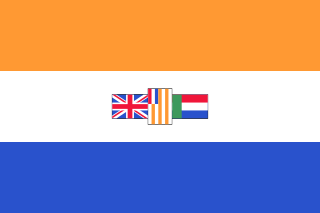
Tswanaland was a Bantustan and then later a non-geographic ethnic-based second-tier authority, the Representative Authority of the Tswanas, in South West Africa, in the far central eastern area of the territory around the village of Aminuis. It was intended by the apartheid government to be a self-governing homeland for the Tswana people.

Thaba 'Nchu, also known as Blesberg, is a town in Free State, South Africa, 63 km east of Bloemfontein and 17 km east of Botshabelo. The population is largely made up of Tswana and Sotho people. The town was settled in December 1833 and officially established in 1873. The town grew larger following the 1913 Natives' Land Act that declared the area a homeland for the Tswana people.

The apartheid system in South Africa was ended through a series of bilateral and multi-party negotiations between 1990 and 1993. The negotiations culminated in the passage of a new interim Constitution in 1993, a precursor to the Constitution of 1996; and in South Africa's first non-racial elections in 1994, won by the African National Congress (ANC) liberation movement.
Ga-Rankuwa is a large settlement located about 37 km north-west of Pretoria. Provincially it is in Gauteng province, but it used to fall in Bophuthatswana during the apartheid years, and under the North West province until the early 2000s.
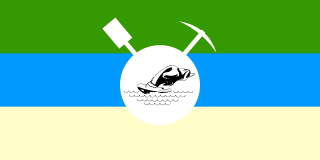
The Royal Bafokeng is the ethnic homeland of the Bafokeng people, a Setswana-speaking traditional community. The monarchy covers 1,000 square kilometers (390 sq mi) in the North West Province of South Africa. The capital is Phokeng, near Rustenburg. "Bafokeng" is used to refer to both the tribal grouping as well as the land its members inhabit. The kingdom's current ruler is Kgosi (King) Leruo Molotlegi, who has reigned since 2000. The Bafokeng first settled in the Rustenburg Valley in c.1450AD, the presence of the ceramics in the area suggests the arrival of the Bafokeng in the Rustenburg Phokeng valley at about this time. Kgosi Tshukudu became the first king of a unified Bafokeng in 1750.
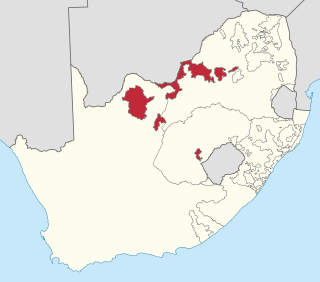
The 1994 Bophuthatswana crisis was a major political crisis which began after Lucas Mangope, the president of Bophuthatswana, a nominally independent South African bantustan created under apartheid, attempted to crush widespread labour unrest and popular demonstrations demanding the incorporation of the territory into South Africa pending non-racial elections later that year. Violent protests immediately broke out following President Mangope's announcement on 7 March that Bophuthatswana would boycott the South African general elections. This was escalated by the arrival of right-wing Afrikaner militias seeking to preserve the Mangope government. The predominantly black Bophuthatswana Defence Force and police refused to cooperate with the white extremists and mutinied, then forced the Afrikaner militias to leave Bophuthatswana. The South African military entered Bophuthatswana and restored order on 12 March.
Mabopane is a residential township in South Africa. It is situated in the Tshwane Metropolitan Municipality, to the north of Pretoria in Gauteng.

The Mahlabatini Declaration of Faith was a statement of core principles laid down by South African political leaders Mangosuthu Buthelezi and Harry Schwarz on 4 January 1974. It was signed in Mahlabatini, KwaZulu-Natal, hence its name. Its purpose was to provide a blueprint for government of South Africa by consent and racial peace in a multi-racial society, stressing opportunity for all, consultation, the federal concept, and a bill of rights. It also first affirmed that political change must take place though non-violent means. It was the first agreement in apartheid South Africa by acknowledged black and white political leaders that subscribed to such principles. Final negotiations, which embodied many of the Declaration's principles, took place between President F. W. de Klerk and Nelson Mandela in the early 1990s.
Parliamentary elections were held in Bophuthatswana between 22 and 24 August 1977. The Bophuthatswana Democratic Party won 43 of the 48 elected seats in the National Assembly.
Parliamentary elections were held in Bophuthatswana in October 1982. The Bophuthatswana Democratic Party won all 72 of the elected seats in the National Assembly.
Parliamentary elections were held in Bophuthatswana on 22 October 1987. The Bophuthatswana Democratic Party won 66 of the 72 of the elected seats in the National Assembly.
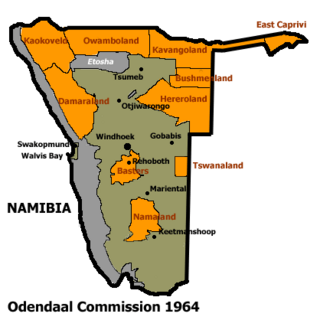
Constance Letang Kgosiemang was the paramount chief of the Tswana people in Namibia, a parliamentarian, and the leader of the Seoposengwe Party until its merger into the Democratic Turnhalle Alliance (DTA).
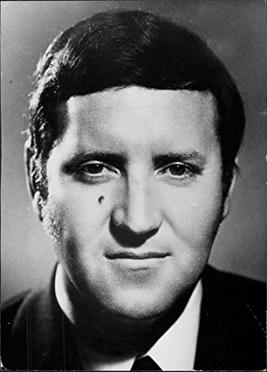
Rowan Cronjé was a Rhodesian politician who served in the cabinet under prime ministers Ian Smith and Abel Muzorewa, and was later a Zimbabwean MP. He emigrated to South Africa in 1985 and served in the government of Bophuthatswana.
Kgomotso Paul Harry Ditshetelo was a South African politician who represented the United Christian Democratic Party (UCDP) in the National Assembly from 1999 to 2009. He was also the deputy president of the UCDP from 1998 to 2011. During apartheid, he was a politician and civil servant in Bophuthatswana.
References
- 1 2 Elections in South Africa's Apartheid-Era Homelands "Bantustans" African Elections Database
- 1 2 Jeffrey Butler, Robert I. Rotberg & John Adams (1977) The Black Homelands of South Africa: The Political and Economic Development of Bophuthatswana and KwaZulu University of California Press p51
- 1 2 3 4 5 6 Butler et al., p93
- 1 2 3 4 5 6 Butler et al., p52